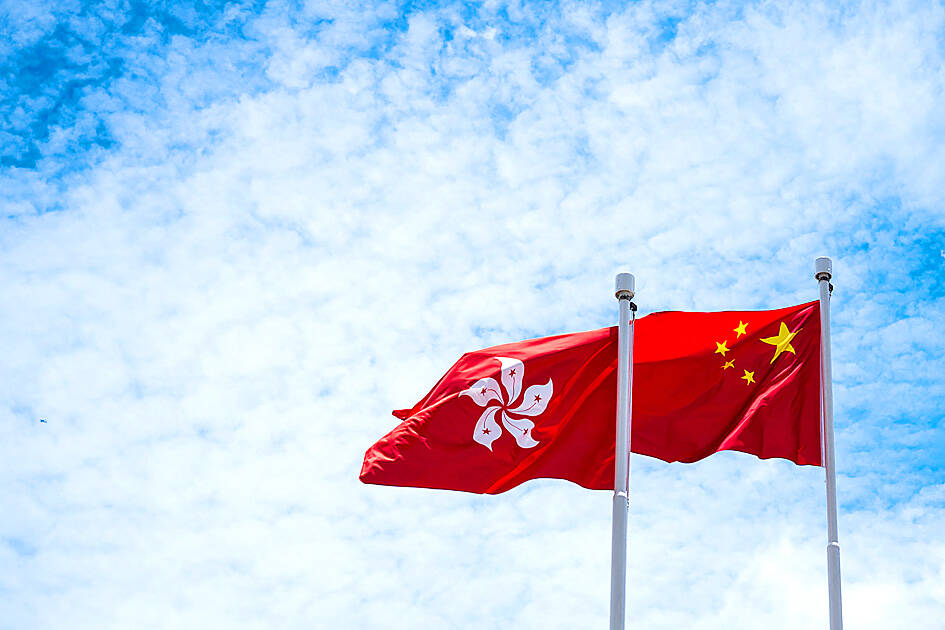A Hong Kong Christian newspaper has left its front page mostly blank ahead of the 35th anniversary of China’s 1989 crackdown on protesters in Tiananmen Square, as concerns mount about dwindling freedoms in the territory.
The weekly Christian Times wrote in its latest issue, an online version of which was published on Saturday, that it “can only respond to the current situation by turning paragraphs into blank squares and white space,” adding that society has become “restrictive.”
Hong Kong used to be the only place on Chinese soil where people could openly mourn those who died on June 4, 1989, when the government sent troops and tanks to crush democracy demonstrations in Beijing.

Photo: AFP
However, public forms of commemoration such as candlelight vigils have been banned or driven underground after Beijing-imposed the National Security Law on the territory in 2020.
Hong Kong this week arrested seven people for sedition, accusing them of making social media posts that “took advantage of an upcoming sensitive date.”
The Christian Times usually publishes content related to the massacre ahead of every anniversary, but this year said its front page could not be printed “due to an issue.”
“In recent years, Hong Kong’s society has changed drastically and become more restrictive,” the paper said in an editorial published along with another mostly redacted article. “Even a prayer based on historical memories may arouse ‘concern.’”
Hong Kong Bishop Stephen Chow (周守仁) this week called for forgiveness and healing in an article that obliquely referenced the June 4 anniversary.
“It is still a sore spot that needs to be properly addressed... Nevertheless, I realize that I cannot wait and must instead move forward,” Chow wrote.
A Catholic mass to commemorate victims of the Tiananmen crackdown — held annually for more than three decades — was axed in 2022 after organizers said they feared contravening Hong Kong law.
Hong Kong authorities have said the national security law was needed to stop violence and restore order after massive pro-democracy protests in 2019, while critics have accused the law of curtailing fundamental freedoms.

Airlines in Australia, Hong Kong, India, Malaysia and Singapore yesterday canceled flights to and from the Indonesian island of Bali, after a nearby volcano catapulted an ash tower into the sky. Australia’s Jetstar, Qantas and Virgin Australia all grounded flights after Mount Lewotobi Laki-Laki on Flores island spewed a 9km tower a day earlier. Malaysia Airlines, AirAsia, India’s IndiGo and Singapore’s Scoot also listed flights as canceled. “Volcanic ash poses a significant threat to safe operations of the aircraft in the vicinity of volcanic clouds,” AirAsia said as it announced several cancelations. Multiple eruptions from the 1,703m twin-peaked volcano in

A plane bringing Israeli soccer supporters home from Amsterdam landed at Israel’s Ben Gurion airport on Friday after a night of violence that Israeli and Dutch officials condemned as “anti-Semitic.” Dutch police said 62 arrests were made in connection with the violence, which erupted after a UEFA Europa League soccer tie between Amsterdam club Ajax and Maccabi Tel Aviv. Israeli flag carrier El Al said it was sending six planes to the Netherlands to bring the fans home, after the first flight carrying evacuees landed on Friday afternoon, the Israeli Airports Authority said. Israeli Prime Minister Benjamin Netanyahu also ordered

Former US House of Representatives speaker Nancy Pelosi said if US President Joe Biden had ended his re-election bid sooner, the Democratic Party could have held a competitive nominating process to choose his replacement. “Had the president gotten out sooner, there may have been other candidates in the race,” Pelosi said in an interview on Thursday published by the New York Times the next day. “The anticipation was that, if the president were to step aside, that there would be an open primary,” she said. Pelosi said she thought the Democratic candidate, US Vice President Kamala Harris, “would have done

Farmer Liu Bingyong used to make a tidy profit selling milk but is now leaking cash — hit by a dairy sector crisis that embodies several of China’s economic woes. Milk is not a traditional mainstay of Chinese diets, but the Chinese government has long pushed people to drink more, citing its health benefits. The country has expanded its dairy production capacity and imported vast numbers of cattle in recent years as Beijing pursues food self-sufficiency. However, chronically low consumption has left the market sloshing with unwanted milk — driving down prices and pushing farmers to the brink — while